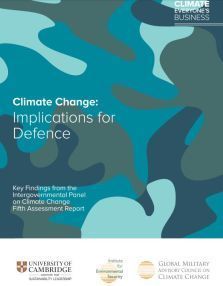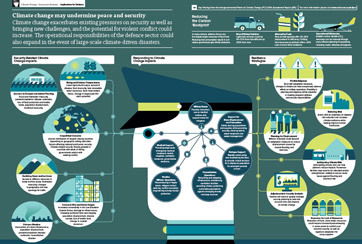New Briefing Highlights Climate Threats To Peace And Security

New Briefing Highlights Climate Threats To Peace And Security
Brussels, 5 June 2015
Whether risks emerge from human aggression or other factors, the core mission of national military forces is to provide protection from threats to security. Climate Change is multiplying threats to peace and stability, forcing military leaders everywhere to adapt strategic planning.
The IES is pleased to present a briefing published today that summarises security-related findings of the Intergovernmental Panel on Climate Change (IPCC) for the leaders of defence communities and associated policy makers. The briefing makes clear that the impacts of climate change will affect all parts of the world, and outlines potential flashpoints of conflict and threats that could require large-scale military response.

The briefing is a joint publication of the Global Military Advisory Council on Climate Change (GMACCC), the Institute for Environmental Security (IES) and the University of Cambridge’s Institute for Sustainability leadership (CISL) with the support of the European Climate Foundation (ECF).
The aim is to provide an accessible and concise summary of key findings of the IPCC’s Fifth Assessment Report (AR5) to be readily used by senior leaders of defence organisations and policy makers to better adapt planning to reduce emerging climate-change-related risks to human security, improve disaster response and increase political stability of fragile states. This publication was born of the belief that the defence sector could make more use of the AR5, which is long and highly technical, if it were distilled into an accurate, accessible, relevant and readable summary.
“This briefing pulls together the disparate parts of the IPCC’s latest report relating to defence into a clear and easy to understand document. It provides vital information on how the defence sector will need to respond to this global challenge.” – MAJOR GENERAL (RET) JOSEPH G SINGH, GUYANA.